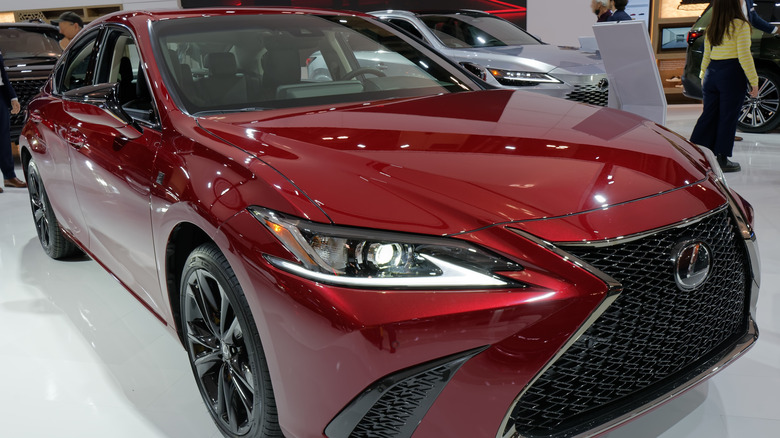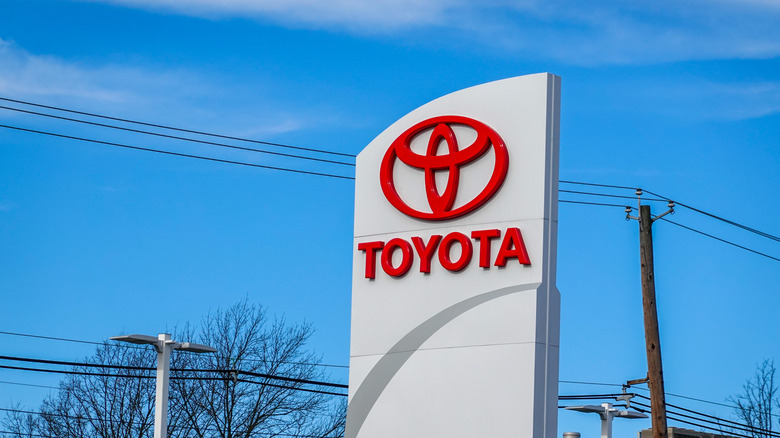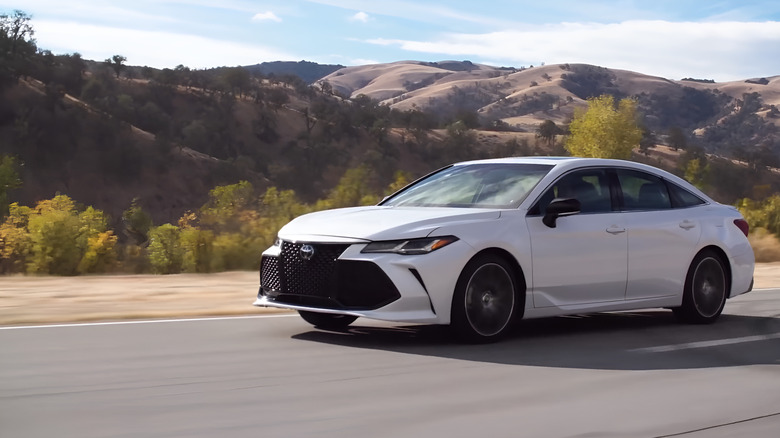The Luxurious Lexus ES Car Alternative That's $10,000 Cheaper
Pricing data from 2025 shows that budget-conscious sedan buyers can still enjoy premium comfort without overspending. According to Edmunds, the price of the 2024 Lexus ES lineup is between $42,040 and $52,330, one of the entry points into luxury-brand ownership. However, there is the 2022 Toyota Avalon, the final model year in its lineup, which shares many core features with the Lexus ES. The Avalon's MSRP ranges from $24,590 to $38,990, per Edmunds, making it a more affordable path to luxury without the luxury price. Also, both cars belong to brands that cost the least over time.
The $13,340 to $17,450 price gap between the Avalon and the Lexus ES translates to about 31.7% to 33.3% in savings, all while delivering many of the same core features. Both the 2024 Lexus ES and the 2022 Toyota Avalon are built on the TNGA-K platform, which means they ride on a 113.0-inch (2,870 mm) wheelbase, deliver virtually identical legroom, and cabin dimensions. They also share a 3.5-liter Dynamic Force V6 engine; 302 horsepower in the Lexus and 301 in the Avalon, while giving owners matching traction and stability control systems for a confident, luxury-grade driving experience. Even in safety, they align closely, with both earning 5-star crash test ratings from the National Highway Traffic Safety Administration, via TrueCar.
Near-identical luxury experience
The 2022 Avalon with its V6 engine, gets about 25 miles per gallon (mpg) on average (22 in the city, 31 on the highway). If you switch to the hybrid version, you'll see around 43 MPG combined in the XLE Hybrid trim and up to 44 mpg in the higher XLE Hybrid model (43 city, 44 highway). The 2024 Lexus ES 250 AWD has about 28 MPG combined (25 city, 34 highway), and the ES 300h hybrid matches the Avalon's top rating with 44 MPG combined (43 city, 44 highway). In plain terms, the gas-only versions lean more on a comfortable ride, while the hybrids on both cars give almost identical savings at the pump, that is if you avoid driving mistakes that can cost you more gas money.
Under the hood, the Avalon comes with a choice of a 3.5-liter V6 that delivers 301 horsepower through an eight-speed automatic, or a 2.5-liter four-cylinder hybrid paired with a CVT and electric motor for a combined 215 horsepower. The Lexus ES, however, offers three tuned engines; a 302-horsepower 3.5-liter V6 for the ES 350 with an eight-speed automatic (and paddle shifters), a 2.5-liter inline-four for the ES 250 AWD, or a 2.5-liter hybrid system with dual electric motors that also makes 215 horsepower. From this, it is clear that both brands use advanced hybrid setups to provide a smooth blend of power and fuel savings.
Long-term savings is the Avalon's advantage
According to Kelley Blue Book (KBB), owning the 2022 Toyota Avalon for five years costs about $51,123, while a 2024 Lexus ES 250 and ES 350 comes in at $66,461 and $62,853, respectively, for the same ownership period. That is over $10,000 difference that can go into funding the rising price of tires manufactured in the United States in 2025. Note that KBB's 5-year cost to own data looks at depreciation, expected fuel costs, insurance, maintenance, taxes, and fees.
On unscheduled repairs and routine maintenance, RepairPal shows the Avalon costs about $463 a year for repairs and routine upkeep, while the ES 350 runs about $468 annually. Over ten years, that adds up to roughly $4,630 for the Avalon and $4,680 for the Lexus, making their long-term repair costs almost identical. Both earn a 4.0 out of 5 reliability rating, so you won't see major differences in how often they need work or the size of the bills.
However, for cost of labor during replacements, a front-brake job on the 2022 Avalon costs between $272 and $368, with replacement parts costing about $158 to $201. On a Lexus ES 350, you'll pay $318 to $406 for the same service, and parts go for $197 to $229. For master-cylinder parts, expect to pay about $259 for the Avalon and $317 to $394 for the Lexus. In real-world terms, that works out to about 20 to 30% lower component prices on the Toyota.


